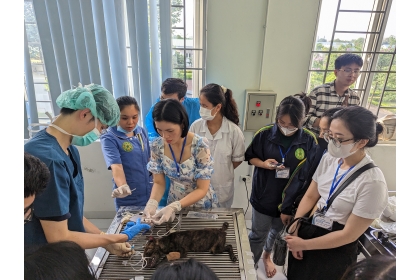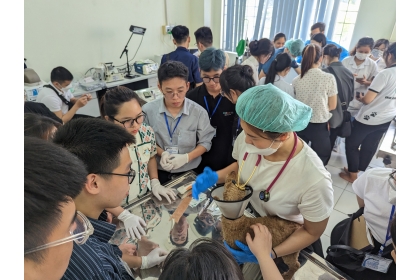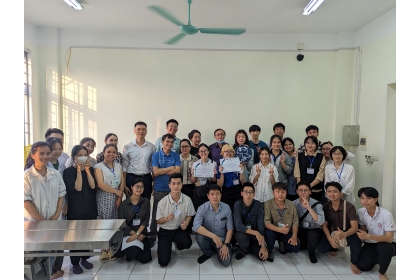USR Project Stray LOHAS Upgraded to Improve the Welfare of Animals Across Nations
2023-05-24
興新聞張貼者
Unit秘書室
1,235
The Ministry of Education's USR project "Stray LOHAS: Stray Animals Reduction and Fulfillment of Welfare" (herein after referred to as the "USR Project") of National Chung Hsing University (NCHU) went to Vietnam from May 13 to 17, 2023 to hold an animal welfare and clinical practice workshop, which attracted over 40 local veterinarians, animal hospital professors, and students of all ages to engage in transnational experience exchanges, fulfilling NCHU's university social responsibility. In the future, we will also invite veterinarians from Vietnam to NCHU Stray LOHAS clinic for exchanges.
New Concepts on How to Treat Animals to Improve Animal Welfare Worldwide
The USR Project has a wealth of experience with training veterinarians in social practices. The team organized a workshop with the Faculty of Veterinary Medicine, Vietnam National University of Agriculture and Hanoi Agriculture Animal Rescue Station for veterinary medicine students, in hopes of improving the techniques and concepts of local veterinarians when treating animals. Vietnam still has room for improvement when it comes to concepts for treating animals compared to Taiwan. Shiun-Long Lin, Associate Professor at the Department of Veterinary Medicine, NCHU and Co-principal Investigator of the USR Project, described it as Taiwan 20 years ago. "Veterinarians are on the front line and at the core of how a nation treats animals overall. Directing efforts in this direction will more efficiently and comprehensively improve the way Vietnam treats animals."
During the workshop, Assistant Professor Kendy Tzu-yun Teng of the Department of Veterinary Medicine, NCHU emphasized theoretical concepts and practices for improving animal welfare, basic conditions of owners' responsibilities, clinical procedures for reducing urgency and pain of animals, and the importance of disease prevention, such as vaccination. Chief Veterinarian Nai-Yan Su of NCHU Stray LOHAS clinic was responsible for explaining basic clinical skills, such as intubation and anesthetization, and provided instructions for students to practice in groups. The correct clinical procedures improved the concepts and abilities of veterinarians in Vietnam to provide humane treatment.
Associate Professor Nguyen Ba Tiep Faculty of Veterinary Medicine, Vietnam National University of Agriculture gave recognition to the workshop. He said that local data show that at least 50% of students in the Faculty of Veterinary Medicine wanted to become veterinarians for companion animals in the future, but Vietnam does not have must medical content relating to companion animals. "We hope that more concepts of how to provide companion animals with friendly treatment will continue to strike root in Vietnam in the future."
Students of the Faculty of Veterinary Medicine who participated in the workshop said that the concept of animal welfare is not common, even in animal hospitals. The workshop made them realize that they need to care more about how animals feel in the treatment process, and the details of actual techniques and procedures need to be more careful in coordination with the concept. They were grateful and felt that the workshop was extremely helpful.
The USR Project was invited to visit the Hanoi Agriculture Animal Rescue Station and private shelters. The Hanoi Agriculture Animal Rescue Station is similar in nature to the NCHU Stray LOHAS clinic in that both aim to cultivate veterinarians for social practices and improve animal welfare. Hoang Minh, the person-in-charge of the rescue station and a lecturer at the Faculty of Veterinary Medicine, Hanoi University of Agriculture, showed the local sterilization environment and process. The project team provided recommendations for details and made a commitment to provide the experience of Taiwan's rescue station for reference in the future.
USR Project Upgraded to Cultivate Transnational Talent
The USR Project has sterilized over 6,000 dogs and cats in rural areas, and vaccinated over 6,000 dogs and cats in shelters. NCHU Stray LOHAS clinic to has aided nearly 500 animals in public and private shelters, and jointly promoted animal protection education and made public policy recommendations together with National Chi Nan University, National University of Tainan, Hungkuang University, National Yunlin University of Science and Technology, and National Kaohsiung University of Applied Sciences.
The project was successfully upgraded to the Ministry of Education's USR – Sustainability-Linked International Cooperation Project in May 2023, and it immediately went overseas to provide medical assistance to animals in Vietnam. Shiun-Long Lin said that they began contacting Hanoi Agriculture Animal Rescue Station in 2021, but it wasn't until this year that they formally began exchanges and cooperation once the borders were opened as the pandemic subsided. This is the first time the project team set foot overseas to fulfill their transnational social responsibility this year. He also mentioned that NCHU, Vietnam National University of Agriculture, the rescue station, and clinic are all effective locations for cultivating transnational talent, and looks forward to working together more in the future.
Kendy Tzu-yun Teng said that reshaping the "mutually beneficial relationship between humans and animals" is her main goal in international cooperation in education. "Animals are not objects and also feel satisfaction and pain like we do. Treating animals on this basis should be included in veterinary medicine training." NCHU will organize an international online seminar with the Vietnam National University of Agriculture in December this year, and will invite experts and scholars to engage in more in-depth and extensive academic exchanges on animal welfare issues.
New Concepts on How to Treat Animals to Improve Animal Welfare Worldwide
The USR Project has a wealth of experience with training veterinarians in social practices. The team organized a workshop with the Faculty of Veterinary Medicine, Vietnam National University of Agriculture and Hanoi Agriculture Animal Rescue Station for veterinary medicine students, in hopes of improving the techniques and concepts of local veterinarians when treating animals. Vietnam still has room for improvement when it comes to concepts for treating animals compared to Taiwan. Shiun-Long Lin, Associate Professor at the Department of Veterinary Medicine, NCHU and Co-principal Investigator of the USR Project, described it as Taiwan 20 years ago. "Veterinarians are on the front line and at the core of how a nation treats animals overall. Directing efforts in this direction will more efficiently and comprehensively improve the way Vietnam treats animals."
During the workshop, Assistant Professor Kendy Tzu-yun Teng of the Department of Veterinary Medicine, NCHU emphasized theoretical concepts and practices for improving animal welfare, basic conditions of owners' responsibilities, clinical procedures for reducing urgency and pain of animals, and the importance of disease prevention, such as vaccination. Chief Veterinarian Nai-Yan Su of NCHU Stray LOHAS clinic was responsible for explaining basic clinical skills, such as intubation and anesthetization, and provided instructions for students to practice in groups. The correct clinical procedures improved the concepts and abilities of veterinarians in Vietnam to provide humane treatment.
Associate Professor Nguyen Ba Tiep Faculty of Veterinary Medicine, Vietnam National University of Agriculture gave recognition to the workshop. He said that local data show that at least 50% of students in the Faculty of Veterinary Medicine wanted to become veterinarians for companion animals in the future, but Vietnam does not have must medical content relating to companion animals. "We hope that more concepts of how to provide companion animals with friendly treatment will continue to strike root in Vietnam in the future."
Students of the Faculty of Veterinary Medicine who participated in the workshop said that the concept of animal welfare is not common, even in animal hospitals. The workshop made them realize that they need to care more about how animals feel in the treatment process, and the details of actual techniques and procedures need to be more careful in coordination with the concept. They were grateful and felt that the workshop was extremely helpful.
The USR Project was invited to visit the Hanoi Agriculture Animal Rescue Station and private shelters. The Hanoi Agriculture Animal Rescue Station is similar in nature to the NCHU Stray LOHAS clinic in that both aim to cultivate veterinarians for social practices and improve animal welfare. Hoang Minh, the person-in-charge of the rescue station and a lecturer at the Faculty of Veterinary Medicine, Hanoi University of Agriculture, showed the local sterilization environment and process. The project team provided recommendations for details and made a commitment to provide the experience of Taiwan's rescue station for reference in the future.
USR Project Upgraded to Cultivate Transnational Talent
The USR Project has sterilized over 6,000 dogs and cats in rural areas, and vaccinated over 6,000 dogs and cats in shelters. NCHU Stray LOHAS clinic to has aided nearly 500 animals in public and private shelters, and jointly promoted animal protection education and made public policy recommendations together with National Chi Nan University, National University of Tainan, Hungkuang University, National Yunlin University of Science and Technology, and National Kaohsiung University of Applied Sciences.
The project was successfully upgraded to the Ministry of Education's USR – Sustainability-Linked International Cooperation Project in May 2023, and it immediately went overseas to provide medical assistance to animals in Vietnam. Shiun-Long Lin said that they began contacting Hanoi Agriculture Animal Rescue Station in 2021, but it wasn't until this year that they formally began exchanges and cooperation once the borders were opened as the pandemic subsided. This is the first time the project team set foot overseas to fulfill their transnational social responsibility this year. He also mentioned that NCHU, Vietnam National University of Agriculture, the rescue station, and clinic are all effective locations for cultivating transnational talent, and looks forward to working together more in the future.
Kendy Tzu-yun Teng said that reshaping the "mutually beneficial relationship between humans and animals" is her main goal in international cooperation in education. "Animals are not objects and also feel satisfaction and pain like we do. Treating animals on this basis should be included in veterinary medicine training." NCHU will organize an international online seminar with the Vietnam National University of Agriculture in December this year, and will invite experts and scholars to engage in more in-depth and extensive academic exchanges on animal welfare issues.




